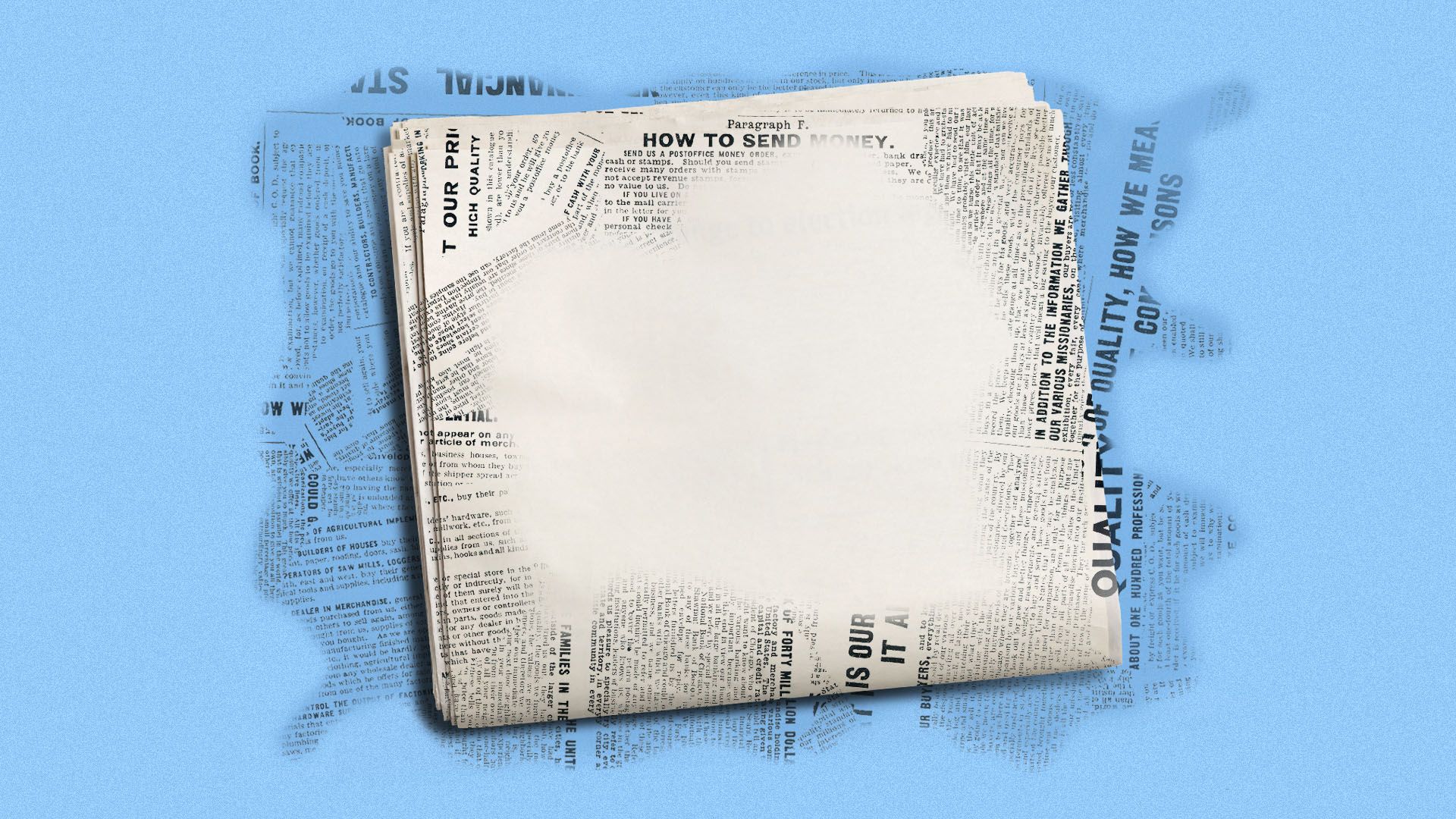Coronavirus presents existential threat for news media
Add Axios as your preferred source to
see more of our stories on Google.

Illustration: Sarah Grillo/Axios
The coronavirus is forcing major media giants to leverage layoffs and pay cuts in order to survive the coronavirus pandemic.
Why it matters: In the first few weeks of the outbreak in the U.S., local outlets were sounding the alarm over lost advertising revenue from shuttered local businesses. As the crisis continues, big national media companies say they are bracing for the worst.
Driving the news: Top media executives have announced rounds of layoffs and cuts to salaries and benefits, and top executives are forgoing pay in the coming weeks.
- Gannett employees making above $38,000 a year are facing unpaid furlough for one week each in April, May and June. CEO Paul Bascobert will forgo his salary for the duration. Other Gannett executives will be taking a 25% pay cut.
- Maven Media, which owns Sports Illustrated and TheStreet, has laid off 9% of its 332-member staff. High-salaried employees will be taking 30% pay cuts. The company has also taken a $12 million line of credit from B. Riley Financial.
- Disney, the parent company to ABC, ESPN, and other brands, has closed its North American parks to abide by distancing guidelines and has had to delay movie premiers and production. It said Monday that executive chairman Bob Iger will forgo his salary and CEO Bob Chapek will take a 50% pay cut during the crisis.
- BuzzFeed will be imposing a graduated salary reduction for its employees, with top executives taking a 14-25% cut. The plan will be applied to the "majority of the company" throughout April and May, and will be reevaluated on a monthly basis. CEO Jonah Peretti won't be taking compensation.
- Vice Media is halting 401K matches and freezing promotions, in addition to enforcing pay cuts for top employees. CEO Nancy Dubuc is taking a 50% pay reduction.
- Group Nine Media is pausing 401K matches and non-mandatory merit increases. CEO Ben Lerer has opted to give up about six months worth of pay right now while other executives are taking a 25% pay cut for the rest of 2020.
Other major outlets have warned of heavy advertising losses. Some have cut distribution.
- The New York Times said in a government filing in early March that it expects global advertising revenue to be down this quarter due to corporate uncertainty related to the coronavirus.
- The Los Angeles Times has reportedly cut some of its print sections and has warned that “most” of its advertising has stopped, according to a tweet from Kevin Roderick, the founder, publisher and editor of LA Observed, a local media website.
- Tampa Bay Times temporarily cut their print publication to only Wednesday and Sunday due to slowed advertising dollars. The paper says they've experienced a "surge in traffic" to their site, but that "those gains are not strong enough to make up for advertising losses." The Times has also announced layoffs.
The big picture: While the recently-passed $2 trillion stimulus bill will provide relief to some news businesses, many in the news industry argue that it's not enough.
- Some argue that the journalism sector should have its own stimulus package that would offer direct support for newsrooms, which are now deemed by the federal government and many state governments as "essential services."
- On Monday, the CEO of the News Media Alliance, a trade group that represents thousands of newspaper publishers and the CEO America’s Newspapers, a trade group that represents dozens of central and southern American newspapers, sent letter to President Trump, Senate Majority Leader Mitch McConnell and House Majority Leader Nancy Pelosi, saying that they needed to begin discussing options for actions the federal government could take to help sustain local news.
Between the lines: For now, relief for the news industry has largely come from the private sector.
- Facebook said Monday that it is spending $100 million to support news outlets around the world that have been impacted by the coronavirus.
- Twitter said Tuesday that it's donating $1 million to journalism non-profits.
Go deeper: Coronavirus sends local news into crisis

